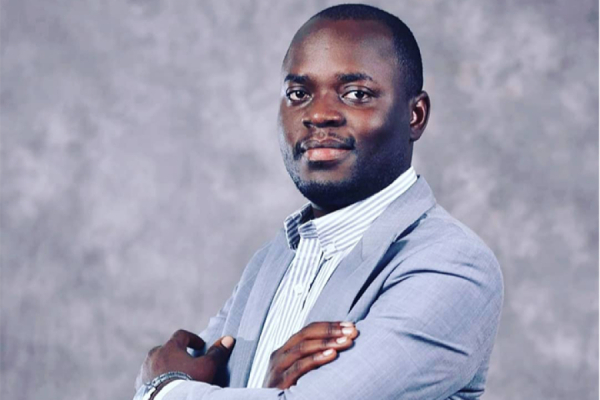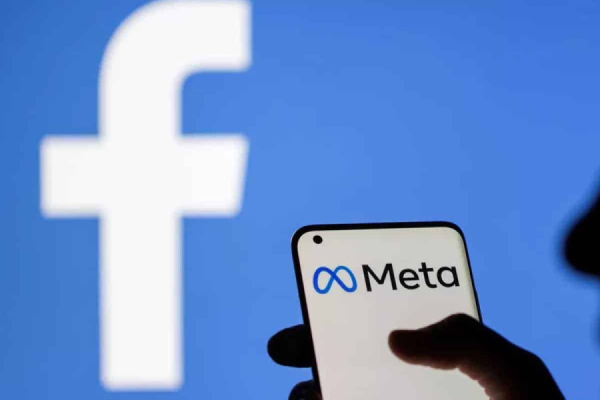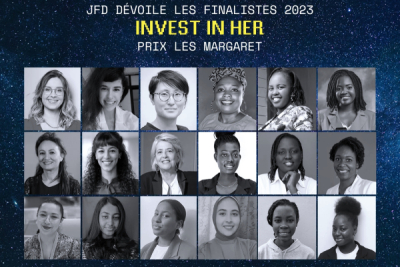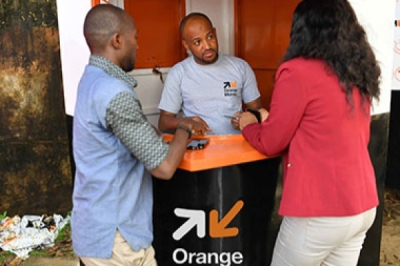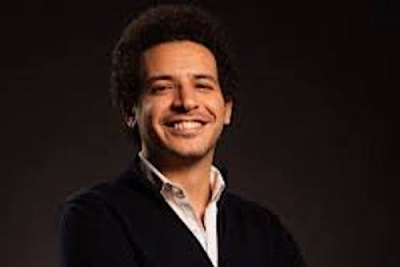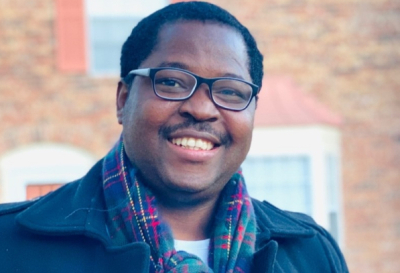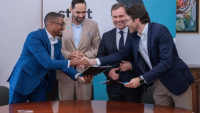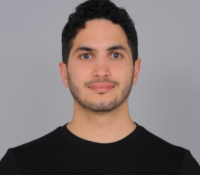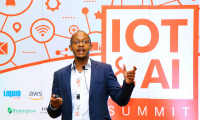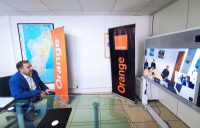He is a tech entrepreneur, agriculture enthusiast, blogger, and coach. Thanks to his IT services startup, Jovan Group, he helps companies implement their digitalization projects.
Josué Vangu (photo) is a Congolese computer engineer who graduated from Unicaf University in 2022 with a master's degree in information systems management. He also holds a bachelor's degree in telecommunications and network administration from the Higher Institute of Computer Science, Programming, and Analysis (ISIPA). In 2018, he founded the IT service company Jovan Group, which he leads as a managing partner.
His service company specializes in the implementation of digital infrastructure and electronic security systems, but also provides training in information technology. It designs and develops electronic security offerings using integrated solutions that adapt to all architectures (from the simplest to the most secure) to address the specific security issues of each business sector.
"Our ambition and vision are to make life easier through technology! This means we focus on the digital transformation of businesses and upgrading the skills of students and IT professionals," said Josué in an interview with Techcabal in February 2023.
To achieve its ambitions, the company has three branches. The first is Jovan Group Academia, which offers practical training to students and a full range of information systems training to professionals, including those transitioning to new jobs, to help them improve their skills.
The second is Jovan Group Electronic Systems & Services, which is an installer and integrator of security systems. The last one is Jovan Group IT Services & Solutions, which provides network infrastructure optimization, and construction services as well as optimal hardware solutions.
In 2020, the company launched ENSOKO, a platform created, according to Josué Vangu, "to provide access to food for Congolese households in a context where Covid-19 was disrupting agricultural products' distribution/marketing chains."
Since 2014, the managing partner has been a freelance blogger. From 2013 to date, he is the IT manager of the youth organization Jeunesse Francophone Congolaise. He is also the coordinator of the Haut-Katanga branch of YPARD, an international organization of young professionals in the agricultural sector.
He started his professional career in May 2013 as a network and systems infrastructure trainer at Univers High Technology. From May to November 2013, he worked for the Canal+ Group in Congo as a part-time customer service technician (SAV). In January 2014, after leaving his job as a trainer, he was hired by StarTimes as an SAV technician. The following year, he joined RD Technologic Sarl as an IT support technician before being promoted to IT and projects manager in 2016. A year later, he was appointed delegate of the company's provincial management in Katanga, where he worked until 2021.
Melchior Koba
Last November, Twitter launched a similar service, allowing its subscribers to authenticate their accounts by paying an eight-dollar monthly fee and receiving benefits such as "direct access to customer service."
This week, Facebook's parent company Meta will launch its paid verification system for Instagram and Facebook users, CEO Mark Zuckerberg announced last Sunday.
Meta Verified is "a subscription service that lets you verify your account with a government ID, get a blue badge, get extra impersonation protection against accounts claiming to be you, and get direct access to customer support," the CEO wrote, adding that the service will launch in New Zealand and Australia as early as this week and will cost $11.99/month on the web and $14.99/month on Apple's iOS. Other countries will get the service later.
This decision comes at a time when the social media giant is going through a difficult financial time. At the end of 2022, the company announced a major layoff plan involving 11,000 people worldwide, or 13% of its workforce. Recently, the Financial Times reported that the company is preparing a new restructuring plan that would start in March 2023.
The new feature aims to increase the authenticity and security of the group's services, according to Mark Zuckerberg. Thus, in addition to the blue tick as a guarantee of security, Meta Verified users will benefit from, among other things, increased visibility and reach on Instagram and Facebook, as well as exclusive stickers.
"As part of this vision, we are evolving the meaning of the verified badge so we can expand access to verification and more people can trust that the accounts they interact with are authentic," Meta explained in a blog post.
Samira Njoya
They are 18 in number. They were selected from hundreds of applicants who sent applications to the JFD Club, a women's network that promotes women's entrepreneurship, intrapreneurship, and innovation.
On Thursday, February 9, the Women's network JFD Club unveiled the 2023 finalists of the three categories of its "Les Magaret Awards", which rewards women entrepreneurs whose innovations are addressing key global issues. From the hundreds of applications received, eighteen women were selected, including nine Africans. They are notably Cameroonians (2), Gabonese (1), Kenyan (1), Senegalese (1), Beninese (1), Egyptian (1), Ghanaian (1), and Ivorian (1) in the three categories (Entrepreneur, Intrapreneur, and junior).
Entrepreneurs
- Nelly Chatué-Diop is a Cameroonian and the co-founder-CEO of Ejara, a digital platform that allows access to investments and savings products from as little as EUR1.5 for Africans.
- Kenyan-born Maryanne Gichanga is the co-founder and CEO of Agritech Analytics, an AI-powered crop and soil management tool that uses satellite data to help farmers improve yield.
- Gabonese Alvine Yeno made it to the list with Ntchina, a community platform that facilitates blood collection.
Intrapreneurs
- Rhoda Oduro is from Ghana. She is the Business Development & Operations Manager for Developers in Vogue, a program designed to address the underrepresentation of women in the technology industry.
- Senegalese-born Ndiate Séne is the regional director of software engineering at PAPS, a non-profit organization that advocates for a better representation of African women in tech.
- Beninese-born Livia Sossou is the Director of Certification & Financing for Kumulus Water, a water services start-up that aims to provide clean water in an economical and sustainable way.
Junior
- Hend Adel, a 17-year-old Egyptian national, is among the finalists thanks to his project to modify the structure of aluminum smokestacks to reduce CO2 emissions and metal residues in the air.
- Frederic Melissa Djouka Fongang, a 17-year-old Cameroonian, created a platform that allows both residents and the diaspora to securely acquire real estate properties in Cameroon.
- 18-year-old Laurianne Yao, from Côte d'Ivoire, is among the finalists thanks to her project E-COL'LECTE, a platform for collecting textbooks and school clothes to be donated to the poorest households.
According to Delphine Remy-Boutang, president of the jury of Les Margaret Awards, a greater number of applications were received for the 2023 edition. “We have seen massive participation of young girls with applications tripling in 2023 for the Junior category. This is an excellent trend which shows the growing desire of this new generation to influence, through digital technology, a future they hope will be better," she said.
The Margaret Awards was launched in 2013. It annually celebrates women entrepreneurs and intrapreneurs in Europe and Africa whose projects and innovations address major societal challenges. The award honors Margaret Hamilton, former director of the software engineering department at the MIT Instrumentation Laboratory who developed the embedded software for NASA's Apollo space program. This year, the award ceremony will take place in Paris next April 17.
Samira Njoya
Digital transformation is gaining momentum around the world since 2020. It is forcing telecom operators in various markets to rethink their business approaches to better meet new consumer needs.
Last Thursday, telecom group Orange unveiled its 2025 strategic plan. The plan, dubbed "Lead the future", focuses on four major points to achieve operational excellence for increased profitability.
Orange thus plans to improve its service quality by introducing more innovative offers that will enhance customer experience. It will also invest in more robust and innovative network infrastructures to provide access to quality telecom services to as many people as possible and strengthen its presence in the Enterprise segment (cybersecurity in particular). It will also take actions to keep growth momentum in the Middle East and Africa.
In Africa in particular, Orange plans to keep rolling out fixed and mobile networks (4G and 5G) to support socio-economic development, and at the same time maintain its strong results on the continent.
The group will accelerate the transformation of Orange Money to a digital platform model that will offer services beyond transfers and payments. The service will be offered to all consumers, whether Orange customers or not, in all countries where the group operates. By the end of 2022, the company reported strong growth in its subscriber base. With more than 29 million active users, it recorded more than EUR100 billion worth of transactions that year.
The telecom company will also continue to strengthen its local presence and its position as a multi-service operator through the deployment of its "Orange Digital Centers". The group will also invest in staff training to facilitate its employees' transition towards new professions in data, cloud, cybersecurity, or AI.
According to the plan, social and environmental responsibility is a priority for Orange in all of its markets. Through an ambitious program, the telecom group is committed to fighting global warming through its CO2 emissions reduction program. The aim of that program is to reduce the group's carbon emissions by more than 30% by 2025 and by 45% more by 2030.
Muriel Edjo
He is an engineer with over 13 years of experience in engineering, project management, business consulting, and entrepreneurship. He helps brands convert their visitors and occasional customers into loyal customers.
Ahmed Khairy (photo) is an Egyptian-born entrepreneur and the co-founder/CEO of Gameball, a marketing platform that enables businesses to grow and increase revenue through effective customer retention.
His startup, founded in 2019, is now the leading customer loyalty platform in the Middle East, serving more than 2,000 businesses and nearly 20 million consumers worldwide. Its Gameball solution is even available on international e-commerce platforms Shopify and WooCommerce's App Store.
On February 7, 2023, the startup announced it closed a US$3.5 million funding round to accelerate product commercialization, customer acquisition, and strategic recruitment. The round was led by 500 Global, P1 Ventures, and Launch Africa Ventures, and also included Seedra Ventures, Arzan Ventures, Propeller, and Core Vision alongside regional angel investors.
"This seed round brings on board renowned investors who will help fuel our growth, marking a critical milestone for us, as we evolve into a truly global platform," said Ahmed Khairy.
Prior to Gameball, in 2011, the entrepreneur co-founded Be Coaching, a life and business coaching and consulting company. Two years earlier he had co-founded the start-up Kite Automation to educate customers about automation technologies and how they simplify life and save energy and the environment. He was, successively, the company's technical manager and sales manager between 2009 and 2011.
In 2011, he joined Schneider Electric as a senior project engineer, where he worked until 2017. Between 2014 and 2017, he was a training partner at Jadarat International, a company specializing in training.
Melchior Koba
He is a social innovator who adapts art to medicine. Using virtual reality, he helps enhance patients' moods to accelerate healing. He has received several awards and honors for his impact on the arts in the health field.
Kunle Adewale (photo) is a Nigerian social entrepreneur and visual artist. He graduated from Obafemi Awolowo University with a Bachelor's degree in Fine and Applied Arts in 2010. He also studied Civic Leadership at Tulane University, New Orleans in 2015. To gain arts in healthcare skills he also participated in related professional courses such as Arts in Health for Helping Professionals in Charlotte, Arts in Medicine at the University of Florida, and Arts in Health Research Intensive, organized by the Center for Arts in Medicine at the University of Florida in collaboration with University College London.
In 2013, he founded the social startup Tender Arts Nigeria, which he is leading as the CEO. Tender Arts Nigeria is a non-profit organization that aims to positively impact children, youth, and adults with a focus on therapeutic arts, arts education, talent development, community building, and civic engagement.
In 2016, Kunle Adewale also launched Arts in Medicine Projects, which facilitate healing through art. The program uses virtual reality to take patients on a journey, allowing them to visit their past (for elderly dementia patients), countries such as Canada, India, and the United States, among others. Patients can also participate in guided dance and meditation sessions and even swim with dolphins if they like. This process stimulates their minds, improving their mood and speeding the recovery process.
"What we noticed from our outreaches is that the opportunity for patients to walk around and see the sun is a deeply cherished experience. Because when you’re trapped within the four walls of a hospital where all you’re used to is cries, it affects your mood and recovery process," the social entrepreneur told TechCabal in February 2023.
His programs have already reached over 15,000 beneficiaries in Nigeria, Ghana, Kenya, South Africa, and the U.S. In 2021, he founded the first Mental Health Fellowship in Nigeria.
In 2014, he was nominated for the Global Teacher Prize by the Varkey Foundation (UK). He was the Nigerian recipient of the 2016 Commonwealth Youth Worker Awards (UK) and was nominated for the JCI Ten Outstanding Young Persons of Nigeria program in 2018. In 2019, then Cincinnati mayor John Cranley declared Kunle Adewale Day (August 2) to celebrate his impact on the global arts in the healthcare field.
Melchior Koba
To successfully implement its digital transformation projects, Cabo Verde is multiplying partnerships with other countries. After its joint subsea fiber interconnection project with Senegal, it recently partnered with the Portuguese archipelago to promote technological innovation.
Last Wednesday, the Cabo Verdean institute for business support and promotion "Cabo Verde Digital" and Startup Madeira, a business incubator based in Madeira, Portugal, signed a memorandum of understanding aimed at stimulating entrepreneurship and boosting the two archipelagos' digital cooperation.
According to Cabo Verdean State Secretary for Innovation Pedro Lopes, the memorandum will help empower young tech entrepreneurs and encourage collaboration and the development of joint projects.
The agreement comes at a time when Cabo Verde is preparing a major digital project. In fact, the country is preparing its EUR40 million technology park, which the government believes will boost the ICT sector by positioning Cabo Verde as an international service center and as a gateway to Africa for major international technology companies.
Madeira Island is also committed to research and innovation. In 1997, the government launched Startup Madeira to offer real support to project promoters and to work for the creation and modernization of companies in every economic sector.
Thanks to the memorandum, Cabo Verde and Madeira plan to pool their experience to identify future cooperation actions to strengthen their respective entrepreneurship ecosystem and facilitate the development of innovative and digital companies.
Samira Njoya
He is a talented and determined innovator who is applying his engineering and scientific expertise to solving the agricultural challenges faced by farmers in developing countries.
Youssef Benkirane (photo) is a Moroccan entrepreneur who graduated from the Swiss Federal Institute of Technology in Lausanne with a master's degree in engineering, management, and entrepreneurship. He also holds a master's degree in general science and strategic management from CentraleSupélec. In 2022, he co-founded the agritech startup Terraa, which he oversees as the CEO.
The startup leverages innovative technologies to source fresh produce from farmers and deliver it to retailers within hours, connecting farmers with retailers, restaurants, and service providers. Its technology platform enables farmers to earn higher incomes and ensures consistent demand for their products while providing retailers with high-quality goods at competitive prices.
It also reduces food waste and decreases greenhouse gas emissions, freshwater use, and land use, contributing to a more environmentally friendly food supply chain.
In a round led by FoodLabs, a European venture capitalist and food, sustainability, and health research studio, Terraa raised US$1.5 million in pre-seed funding on February 14, 2023. Other investors in the round included UM6P Ventures, Outlierz Ventures, Musha Ventures, and DFS Lab.
"In the next few months, we will build some collection centers in all the major agricultural cities of Morocco. We will use them to store the produce collected from the farmers for distribution to the end customers," Youssef Benkirane told TechCrunch after the funding round.
Since 2021, the tech entrepreneur is an advisor for the decentralized autonomous organization MakerDAO. His professional career started in 2014 when he joined Rolex as an industrial engineer. Concurrently, he was a software engineer for luxury goods retailer Richemont.
In 2015, he was hired by the food and beverage company Try The World as a growth and data manager. Two years later, he joined Argon & Co, a Paris-based management consulting firm, as a senior consultant. In January 2019, he was named a senior partner at the consulting firm Bain & Company, and in December of the same year, he became a consultant at the firm. From 2021 to the creation of Terraa, he was the general manager of Zapp, a grocery retail company.
Melchior Koba
He is a tech entrepreneur with a strong background in data and artificial intelligence. His startup leverages those tools to help businesses engage customers more effectively.
Mutembei Kariuki (photo) is a Kenyan tech entrepreneur with a Master of Science in Information Systems from the Kobe Institute of Computing (Japan) and a Bachelor in Economics and political science from the Catholic University of Eastern Africa (Kenya). He is mostly known as the co-founder and CEO of AI-as-a-service startup Fastagger.
His AI startup, Fastagger, was founded in 2019. It is an AI and blockchain platform that helps merchants and designers increase sales and build customer loyalty. In February 2023, it announced an undisclosed investment from global blockchain investor CV VC and plans to expand its cutting-edge AI and blockchain technology capabilities.
Pleased to now be working with CV VC, Mutembei Kariuki said, "Our focus is on providing innovative solutions that utilize the best of both worlds to create new opportunities for businesses and individuals. I am confident that this investment will help us to accelerate our growth and bring our vision to life. Our team is excited to work with CV VC to achieve our mission and make a real impact in the world."
The tech entrepreneur entered the professional world, in 2007, as a telemarketer for KPMG East Africa. In 2008, he joined The Pacific Institute as a facilitator before becoming the national vice president of talent management for AISEC Austria the following year. From 2010 to 2011, he was the global coordinator of Potencia Ventures. Concurrently, he was the India manager of IDEX Accelerator's Global Fellows Program.
In 2012, he oversaw the Kenyan expansion of the waste manager Shirai group. The following year, he became an associate of the global non-profit organization Acumen. From 2016 to 2017, he worked for the Kenyan training center Amani Institute as a social innovation manager. He has also been the East African regional coordinator of German Development Agency GIZ's tech entrepreneurship initiative Make-IT in Africa (between 2017 and 2019).
Melchior Koba
Orange Madagascar is stepping up investments in rural infrastructure to bring mobile services to the unconnected half of the Malagasy population. The company signed an agreement in January with NuRan Wireless to build 500 new telecom sites over ten years.
Telecom operator Orange Madagascar has signed an agreement with telecom tower builder Africa Mobile Networks (AMN) to further expand its network coverage in rural areas in Madagascar. Under that agreement, the two partners intend to deploy at least 500 base stations under the Network-as-a-Service (NaaS) model over the next ten years.
The sites to be built under this project will support both 2G and 3G. Their deployment has already begun and some are expected to be operational by the end of 2023, we learn.
The partnership comes about a month after Orange Madagascar signed a similar agreement with Canadian company NuRAN Wireless to deploy 500 telecom sites on Madagascar's east coast, as part of its strategic goal to establish itself as the leading digital service provider in the country.
The investment in rural areas is expected to accelerate Orange Madagascar's ambition, as these areas have a high concentration of unconnected people, and therefore potential telecom subscribers. According to the Communication Technology Regulatory Authority (ARTEC), only 46.38% of the Malagasy population has access to mobile telecom services. The project is expected to enable the telecom operator to reach more than one million new subscribers.
It is also expected to support AMN's ambition to help expand the mobile network in rural areas in sub-Saharan Africa with the deployment of 10,000 towers by 2025. In November 2022, it secured US$20 million from Finnfund and BlueOrchard Finance to fund that plan.
Isaac K. Kassouwi
More...
The coronavirus pandemic accelerated digital transformation projects in Africa, boosting demand for digital tools. This creates a funding gap, which is partially filled by investment funds and venture capital firms.
Pan-African diversified group Axian announced Monday (Feb 13), the launch of Axian Investment, an entity that will manage its investments in tech and innovative companies in Africa.
According to the press release issued by the group, Axian Investment will aim to share the group's experience and provide support, directly and indirectly, to companies at different stages of maturity.
"It will empower AXIAN Group to deliver an even broader positive impact through diverse yet synergized investments, reaffirming its commitment to support entrepreneurs and create shared and inclusive values. Meanwhile, supporting Africa’s growing position within the global economy," the release informs.
The Pan-African group kickstarted the implementation of its long-term investment strategy in 2017 by taking indirect stakeholding in companies and startups. To date, it has invested in 20 private equity and venture capital funds "across the world, but with a strong regional focus on Africa."
Currently, its venture capital branch is a minority shareholder in 10 African start-ups. It aims to accelerate its activity and spread across the entire ecosystem (fintech, e-commerce, e-health́, e-logistics...). It will also create synergies with the group's other activities.
Samira Njoya
He is a visionary entrepreneur who focuses on quality and innovation to improve local food systems and provide healthy and affordable food to the population. He founded two start-ups that serve his goal of developing the agricultural sector in Africa.
Shikama Dioscore (photo) is a Rwandan entrepreneur who graduated from the National University of Rwanda with a bachelor's degree in plant biology and conservation in 2012. He is also the founder and CEO of the food distribution startup Food Bundles.
His startup, founded in 2020, wants to optimize the fresh distribution chain in urban areas while creating a resilient and sustainable marketplace for small-scale farmers. Its digital platform specifically connects farmers with buyers in urban areas.
In 2011, he founded AgriGo, another agritech company that helps farmers improve yields.
With an AgriGo account, farmers can access information on virtually any topic that directly affects their day-to-day business. The startup also provides a management platform for agricultural cooperatives that have to manage thousands of farmers. Using its platform, financial institutions can also inform farmers of financing opportunities.
Shikama is one of the founding members of Rwanda Youth in Agribusiness Forum (RYAF), a forum that aims at "promoting and advocating the business of youth who are involved in farming." From 2016 to 2022, he headed the forum's Information and Communication Technology for Agriculture (ICT4Ag) cluster. As such, his work included " engaging the right partners to stimulate the use of ICT4Ag, and develop the youth who are creating technology solutions to boost farming and the agriculture value chain in general."
The Alibaba eFunders fellow (2017) was one of the founding members of the Rwanda Young ICT Entrepreneurs Association, which aimed to inspire "tech Entrepreneurship among young Rwandans, develop strong business and interpersonal skills, and thus facilitate the creation of jobs in Rwanda’s Technology space." He remained a member of the association from 2012 to 2021. Between 2011 and 2012, he was a reporter and Kinyarwanda translator for the Rwandan multimedia company IGIHE.
Melchior Koba
He is a chartered accountant whose professional career includes positions at multinational corporations. He founded the fintech company Lulalend to allow access to quick and transparent business funding for SMBs.
Trevor Gosling (photo) is a South African chartered accountant who graduated from the University of Pretoria, where he studied from 2000 to 2004. He is also a tech entrepreneur. In 2014, he co-founded the financial technology startup Lulalend, which provides South African businesses with the funds they need to grow.
His startup offers up to US$280,000 in business financing to businesses that have been in operation for at least a year and have monthly sales of about US$2,200. The startup has developed a system that uses various data points to analyze loan applicants' financial health, business model, and cash flow potential to enable sound credit decisions.
In February 2023, the startup completed a US$35 million Series B funding round. The financial resources are expected to help expand its operations in South Africa and commercialize new products to improve access to financing for more than 2 million formal and informal small and medium-sized enterprises (SMEs) in the country.
" With this additional capital available, and the support of our investors, we are now better placed than ever to deliver on our vision of driving financial inclusion and acting as a catalyst for growth across the SME sector. […] I’m incredibly excited about the future of Lulalend and the positive impact we can have on South Africa’s SMEs, which as we know are so crucial to the nation’s economic development," Trevor Gosling said.
Before Lulalend, in 2012, Trevor founded 5 ounces, an e-commerce platform specializing in wine and gourmet products. The platform was acquired by Naspers Group in May 2013 but the founder remained its CEO until 2014.
His professional career started in 2005, at KPMG which employed him as a senior accountant. In 2008, he joined Rand Merchant Bank as an investment banker. In the following years, he assumed the same position at Goldman Sachs before returning to Rand Merchant Bank, in 2010, as a structured finance specialist.
Melchior Koba
Rwanda is among the African nations with a commendable level of digital readiness. All sectors are being transformed in the country, including education.
Rwanda wants to connect additional 3,000 schools to the internet by 2024, ICT Minister Paula Ingabire recently indicated during a Plenary Sitting of the Chambers of Deputies.
Responding to questions on the project, she responded "Currently, there are 6,756 schools, including elementary schools, secondary schools, and technical and vocational education and training (TVET) in the country. Of these schools, about 3,000, or 44.4% of the total, are not connected to the Internet."
"We have Smart Education Project, through the US$30 million financing we got from China Exim Bank, under which we will connect at least 1,500 schools," she added.
In addition to China Exim Bank, which is supporting the Rwandan government's digital transformation project, the World Bank approved US$100 million to finance the project in 2021. The aim was to boost access to broadband internet, increase digital use and enhance the digital innovation ecosystem.
According to Minister Ingabire, most of the financial resources were allocated to infrastructure for last-mile connectivity, including Internet access for schools. "By using the funds from the China Exim Bank, and those from the World Bank, it was observed that about 3,000 schools that are not connected to the internet will have access to it by 2024," she said.
For Emmanuel Mfitumukiza, president of the Rwandan chapter of the Internet Society, Internet connectivity in primary and secondary schools will help implement a skills-based curriculum and increase digital literacy in even the most remote schools in the country.
Samira Njoya


